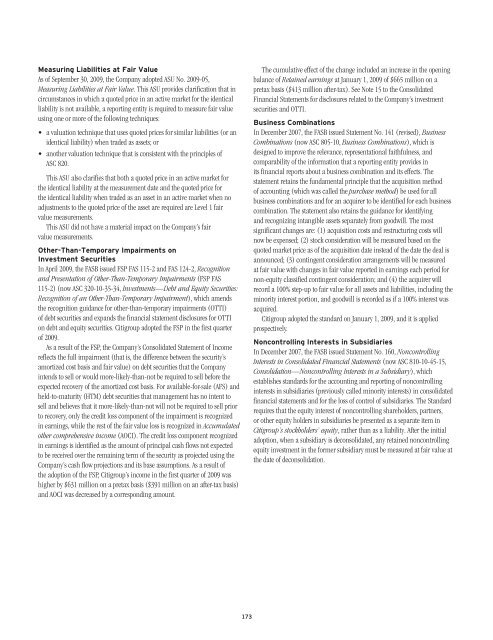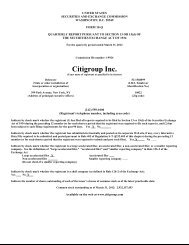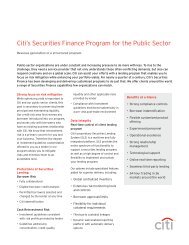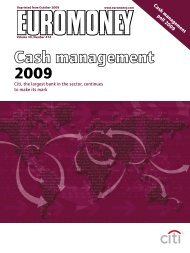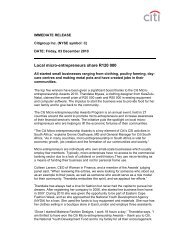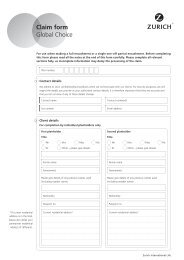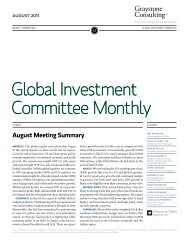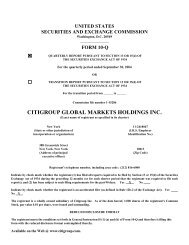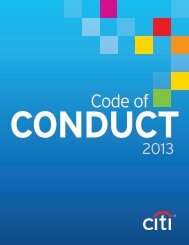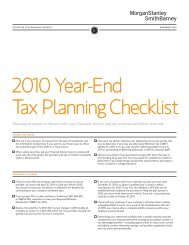Citigroup Inc.
Citigroup Inc.
Citigroup Inc.
You also want an ePaper? Increase the reach of your titles
YUMPU automatically turns print PDFs into web optimized ePapers that Google loves.
Measuring Liabilities at Fair ValueAs of September 30, 2009, the Company adopted ASU No. 2009-05,Measuring Liabilities at Fair Value. This ASU provides clarification that incircumstances in which a quoted price in an active market for the identicalliability is not available, a reporting entity is required to measure fair valueusing one or more of the following techniques:• a valuation technique that uses quoted prices for similar liabilities (or anidentical liability) when traded as assets; or• another valuation technique that is consistent with the principles ofASC 820.This ASU also clarifies that both a quoted price in an active market forthe identical liability at the measurement date and the quoted price forthe identical liability when traded as an asset in an active market when noadjustments to the quoted price of the asset are required are Level 1 fairvalue measurements.This ASU did not have a material impact on the Company’s fairvalue measurements.Other-Than-Temporary Impairments onInvestment SecuritiesIn April 2009, the FASB issued FSP FAS 115-2 and FAS 124-2, Recognitionand Presentation of Other-Than-Temporary Impairments (FSP FAS115-2) (now ASC 320-10-35-34, Investments—Debt and Equity Securities:Recognition of an Other-Than-Temporary Impairment), which amendsthe recognition guidance for other-than-temporary impairments (OTTI)of debt securities and expands the financial statement disclosures for OTTIon debt and equity securities. <strong>Citigroup</strong> adopted the FSP in the first quarterof 2009.As a result of the FSP, the Company’s Consolidated Statement of <strong>Inc</strong>omereflects the full impairment (that is, the difference between the security’samortized cost basis and fair value) on debt securities that the Companyintends to sell or would more-likely-than-not be required to sell before theexpected recovery of the amortized cost basis. For available-for-sale (AFS) andheld-to-maturity (HTM) debt securities that management has no intent tosell and believes that it more-likely-than-not will not be required to sell priorto recovery, only the credit loss component of the impairment is recognizedin earnings, while the rest of the fair value loss is recognized in Accumulatedother comprehensive income (AOCI). The credit loss component recognizedin earnings is identified as the amount of principal cash flows not expectedto be received over the remaining term of the security as projected using theCompany’s cash flow projections and its base assumptions. As a result ofthe adoption of the FSP, <strong>Citigroup</strong>’s income in the first quarter of 2009 washigher by $631 million on a pretax basis ($391 million on an after-tax basis)and AOCI was decreased by a corresponding amount.The cumulative effect of the change included an increase in the openingbalance of Retained earnings at January 1, 2009 of $665 million on apretax basis ($413 million after-tax). See Note 15 to the ConsolidatedFinancial Statements for disclosures related to the Company’s investmentsecurities and OTTI.Business CombinationsIn December 2007, the FASB issued Statement No. 141 (revised), BusinessCombinations (now ASC 805-10, Business Combinations), which isdesigned to improve the relevance, representational faithfulness, andcomparability of the information that a reporting entity provides inits financial reports about a business combination and its effects. Thestatement retains the fundamental principle that the acquisition methodof accounting (which was called the purchase method) be used for allbusiness combinations and for an acquirer to be identified for each businesscombination. The statement also retains the guidance for identifyingand recognizing intangible assets separately from goodwill. The mostsignificant changes are: (1) acquisition costs and restructuring costs willnow be expensed; (2) stock consideration will be measured based on thequoted market price as of the acquisition date instead of the date the deal isannounced; (3) contingent consideration arrangements will be measuredat fair value with changes in fair value reported in earnings each period fornon-equity classified contingent consideration; and (4) the acquirer willrecord a 100% step-up to fair value for all assets and liabilities, including theminority interest portion, and goodwill is recorded as if a 100% interest wasacquired.<strong>Citigroup</strong> adopted the standard on January 1, 2009, and it is appliedprospectively.Noncontrolling Interests in SubsidiariesIn December 2007, the FASB issued Statement No. 160, NoncontrollingInterests in Consolidated Financial Statements (now ASC 810-10-45-15,Consolidation—Noncontrolling Interests in a Subsidiary), whichestablishes standards for the accounting and reporting of noncontrollinginterests in subsidiaries (previously called minority interests) in consolidatedfinancial statements and for the loss of control of subsidiaries. The Standardrequires that the equity interest of noncontrolling shareholders, partners,or other equity holders in subsidiaries be presented as a separate item in<strong>Citigroup</strong>’s stockholders’ equity, rather than as a liability. After the initialadoption, when a subsidiary is deconsolidated, any retained noncontrollingequity investment in the former subsidiary must be measured at fair value atthe date of deconsolidation.173


